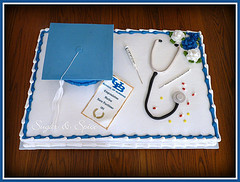Is there a doctor in the house? You might as well be one, according to a new AARP study of family caregiver responsibilities. I just blogged about the research and realized how lucky I was that I didn’t have to perform medical tasks with my parents or mother-in-law. Intravenous feedings? Caregiving is already so complicated emotionally and logistically.
Examine my blog:
Family caregivers: If you’re ever looking for a new career, you might want to consider nursing or medicine. Results from the national survey “Home Alone: Family Caregivers Providing Complex Chronic Care,” released this week, suggest your learning curve may not be very steep.
Yes, family caregivers still perform typical tasks such as bathing, dressing, toileting, eating, shopping and handling finances. But the survey reveals the scope of duties often goes far beyond these responsibilities to include handling wound care, administering intravenous fluids and operating specialized medical equipment. Home dialysis. Suctioning. Ventilators. Scary!
Add to the list uncooperative recipients, inordinate amounts of time required to perform these sophisticated tasks and stress over making mistakes. What’s more, many of the 1,677 caregivers who participated in this joint AARP Public Policy Institute/United Hospital Fund online survey felt they didn’t get enough training or support.
For further admiration of family caregivers, check out these critical survey findings:
- 78 percent managed medication, including intravenous feedings, as well as injections. Nearly half dispensed five to nine prescription medications daily and 65 percent also took one to four over-the-counter pills.
- Almost half, or 46 percent, performed medical/nursing tasks for those with multiple chronic physical and cognitive issues.
- 53 percent who had medical/nursing responsibilities also coordinated care—more than double the rate of those who predominately gave personal care.
- More than half who did complex nursing/medical tasks said there was no one else to do it or insurance wouldn’t pay for a professional.
- The majority managing five or more nursing/medical duties believed their help allowed a family member to stay out of a nursing home. While caregivers felt that they were doing something important, more than half felt depressed or hopeless and more than one-third reported being in fair or poor health.
- 47 percent had no training for managing the medications, with more than 60 percent saying they learned how to manage at least some of the medications themselves.
Okay readers. What kinds of caregiving duties do you do? Which do you consider the hardest and why? Do you have any strategies to make your job easier? Let’s get the conversation going!
Photo courtesy of cakencookiebakr via Creative Commons


